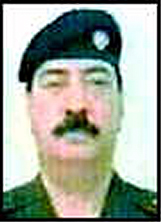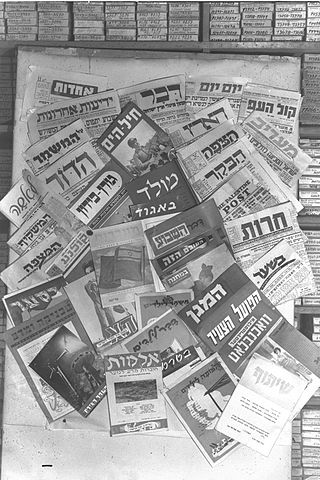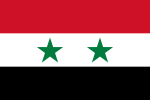Mass media in Libya describes the overall environment for the radio, television, telephone, Internet, and newspaper markets in Libya.

Politics in the Syrian Arab Republic takes place in the framework of a presidential republic with nominal multi-party representation in People's Council under the Ba'athist-dominated National Progressive Front. In practice, Syria is a one-party state where independent parties are outlawed; with a powerful secret police that cracks down on dissidents. Since the 1963 seizure of power by its Military Committee, the Arab Socialist Ba'ath Party has governed Syria as a totalitarian police state. After a period of intra-party strife, Hafez al-Assad gained control of the party following the 1970 coup d'état and his family has dominated the country's politics ever since.
The Syrian Ministry of Communications retains governmental authority over the internet in Syria. Prior to the Syrian civil war, telecommunications in Syria were slowly moving towards liberalization, with a number of licenses awarded and services launched in the Internet service provision market. The initiative reflected the government's change in attitude towards liberalization, following its promise to the European Union to liberalize markets by 2010. All other forms of fixed-line communications are provided by the state-owned operator, Syrian Telecom (STE).
The National Progressive Front is a pro-government coalition of left-wing parties in Syria that supports the Arab nationalist and Arab socialist orientation of the government and accepts the "leading role" of the ruling Arab Socialist Ba’ath Party. The coalition was formed on the basis of the Popular Front model of Socialist Bloc, through which Syrian Ba'ath party governs the country by permitting nominal participation of smaller, satellite parties. The NPF is part of Ba'ath Party's efforts to expand its support base and neutralize prospects for any sustainable liberal or left-wing opposition, by instigating splits within independent leftist parties or repressing them.
As of the early 2000s, Sudan had one of the most restrictive media environments in Africa. Sudan's print media since independence generally have served one of the political parties or the government in power, although there occasionally were outspoken independent newspapers.

El Watan is an independent French-language newspaper in Algeria.
Mass media in Morocco includes newspapers, radio, television, and Internet.
The media of Libya consists of a broad range of newspapers, TV channels, radio stations, and websites mostly set up during or after the Libyan Civil War, which removed previously tight restrictions on freedom of the press and freedom of speech. By the summer of 2012, there were over 200 registered newspapers, over 20 TV channels, and 200 radio stations.

Mohammed Younis al-Ahmed al-Muwali, aka Khadr al-Sabahi, is a former senior member of the Iraqi Ba'ath Party. Ahmed currently has a million dollar bounty placed on his head as one of Iraq's most wanted men accused of funding and leading resistance operations. He is the leader of al-Awda; an underground Ba'athist movement in Iraq.

There are over ten different languages in the Israeli media, with Hebrew as the predominant one. Press in Arabic caters to the Arab citizens of Israel, with readers from areas including those governed by the Palestinian National Authority. During the eighties and nineties, the Israeli press underwent a process of significant change as the media gradually came to be controlled by a limited number of organizations, whereas the papers published by political parties began to disappear. Today, three large, privately owned conglomerates based in Tel Aviv dominate the mass media in Israel.
Television in Syria was formed in 1960, when Syria and Egypt were part of the United Arab Republic. It broadcast in black and white until 1976. In 1985 a second channel was established and in 1995 Syrian television rented a channel on Arabsat and it started broadcasting eight hours daily via satellite in 1996. Syrian channels are mostly owned and controlled by the Syrian Arab Television and Radio Broadcasting Commission (SATRBC) which is connected to the Ministry of Information. It has 4,800 staff; both government employees and freelancers.

Television, magazines, and newspapers have all been operated by both state-owned and for-profit corporations which depend on advertising, subscription, and other sales-related revenues. Even though the Constitution of Russia guarantees freedom of speech, the press has been plagued by both government censorship and self-censorship.
The mass media in Iraq includes print, radio, television, and online services. Iraq became the first Arab country to broadcast from a TV station, in 1954. As of 2020, more than 100 radio stations and 150 television stations were broadcasting to Iraq in Arabic, English, Kurdish, Turkmen, and Neo-Aramaic.
The mass media in Turkmenistan are among the world's most tightly controlled. The press is controlled by the government, which funds nearly all newspapers, criticism of the president is forbidden, and state licensing policy effectively eliminates all outlets not reflecting official views. To avoid reprisal, domestic and foreign journalists engage in self-censorship.
Free speech in the media during the Libyan civil war describes the ability of domestic and international media to report news inside Libya free from interference and censorship during the civil war.
The mass media in South Sudan is underdeveloped compared to many other countries, including fellow East African states like Kenya, Tanzania, and Uganda. Poor transportation infrastructure and entrenched poverty in the country inhibit both the circulation of newspapers, particularly in states located far from the capital of Juba, and the ability of media outlets to maintain regular coverage of the entire country.

The Arab Socialist Ba'ath Party, also referred to as the pro-Iraqi Ba'ath movement, is a neo-Ba'athist political party which was headquartered in Baghdad, Iraq, until 2003. It is one of two parties which emerged from the 1966 split of the original Ba'ath Party.

The Syrian revolution, also known as the Syrian Revolution of Dignity, was the series of mass protests and uprisings – with subsequent violent reaction by the Syrian Arab Republic – lasting from March 2011 to June 2012, as part of the wider Arab Spring in the Arab world. The revolution, which demanded the end of the decades-long rule of Assad family, began as minor demonstrations during January 2011 and transformed into nation-wide mass protests in March. The uprising was marked by large-scale protests against the Ba'athist dictatorship of president Bashar al-Assad, meeting with police and military violence, massive arrests and a brutal crackdown, resulting in thousands of deaths and tens of thousands wounded.
The General Organization of Radio and TV, also known in French as Organisation de la Radio et la Télévision Arabe Syrienne, is the state and public broadcaster in Syria and reports to the Ministry of Information. Earlier names were Radio and Television and Syrian Radio & Television (SRT).
The Sultanate of Oman, established on August 9, 1970, is an absolute monarchy in which all the power resides with the sultan. The government controls what information the mass media relays, and the law prohibits any criticism of the Sultan or government.








